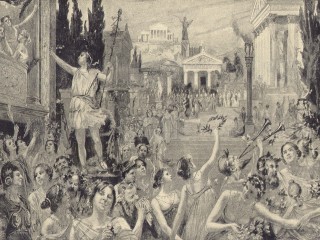
Pisistratus biography
Date of birth : -
Date of death : -
Birthplace : Greece
Nationality : Greek
Category : Historian personalities
Last modified : 2010-09-10
Credited as : Tyrant, descendant of Solon, golden age
3 votes so far
Golden Age.
Pisistratus ruled Athens by the use of force, but as a turannos (tyrant) he was benevolent and law-abiding. Aristotle called his reign the "golden age"; it was noted for the expansion of industry and commerce, domestic tranquility, and neutrality in foreign affairs. A consummate politician, Pisistratus made a point to please the city population as well as the rural majority.
Pisistratus came to power as an advocate for the rural classes, immediately after Solon left Athens in 565 B.C. His rivals were Megacles, leader of the Alcmaeonidae, and Lycurgus, who represented the coast and merchant parties. Pisistratus was driven out of Athens, but then returned several times, and Megacles was sometimes an ally, and later a rival, and played a role in his alternate banishments and restorations. After Pisistratus was banished for the second time in 556 B.C., he spent many years in Euboea, where he made a great deal of money mining. After ten years he returned again to Athens in triumph, and from that point on, to his death in 528 B.C., he was the undisputed leader of Athens. He succeeded in exiling Megacles and the entire clan of the Alcmaeonidae, and they were not able to return to Athens for an entire generation. Pisistratus reigned for over twenty five years, and during this time, Athens was very prosperous, and became a center for learning, commerce and culture. He instituted the Panatheniac Games, commissioned the first written version of Homer's Iliad and Odyssey, and promoted drama and scholarship. He was succeeded in his dictatorship by his sons Hippias and Hipparchus.
Achievements.
During this period Athens grew from a conglomeration of villages into a city, and Pisistratus beautified the marketplace and improved the water supply by building an aqueduct. In rural affairs, he made loans to small farmers for tools and equipment and instituted a system of traveling judges to hear country cases on the spot. Under his reign, religious festivals such as the Panathenaea and the City Dionysia were introduced or expanded. He financed these extensive programs by revenues from the mines at Mount Pangaeum and Laurium in addition to a 5 percent tax on all agricultural products. Pisistratus died in 527 b.c.e. and was succeeded by his sons Hippias and Hipparchus. His encouragement of Athenian prosperity helped to make the city a contending power in Greece.
















